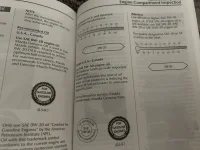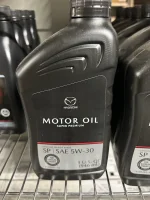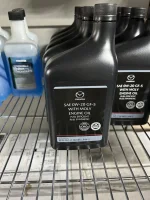Why not?Now the issue is, how would you even determine if an oil is better or even as good as an API oil if it didn't possess the certification?
Take the manufacturers word for it?
You are using an out of date browser. It may not display this or other websites correctly.
You should upgrade or use an alternative browser.
You should upgrade or use an alternative browser.
Questions for the “only oils with approvals!” crowd- API vs good oil engineering
- Thread starter SubieRubyRoo
- Start date
- Status
- Not open for further replies.
That's not an answer. Specifically why not?Lots of reasons.
As they say, trust but verify.
It definitely is.That's not an answer. Specifically why not?
Anyone can make a recommendation, but without data that is specific to your situation (application), you are relying on one’s reputation as the sole means of validation.
What do you mean "without data"?It definitely is.
Anyone can make a recommendation, but without data that is specific to your situation (application), you are relying on one’s reputation as the sole means of validation.
Why not?
1.
Because manufacturers of the oil have an inherent reason to make errors in favor of themselves selling more oil... because they literally exist by selling oil.
Let's be clear... everyone makes errors. Certifications exist to limit this but certainly don't eliminate it.
Lack of certification and relying solely on manufacturers self reports can lead to unintentional (or intentianal but usually unintentional) errors...
A. Confirmation bias. The oil manufacturer unintentionally seeks to CONFIRM their oil is of the best quality as opposed to starting with the assumption that it may not be as in certifications.
B. Selection errors. The manufacturer seeks out tests (selects intruments or tests) that show their oil as "better" but ignores results or tests of attributes that may not be better at all
C. Construct validity errors. The manufacturer uses tests that don't accurately represent the real world environment or operating conditions of the product.
2. History
In science, history means a change in the conditions over time. Meaning what you studied in 2020 may not represent the same results if you study it today.
Taking a manufacturers "word" for something today may not be true tomorrow. Without certifications they are free to change their processes, ingredients, etc any time they choose.
Anything a company tells me is nothing more than ad copy until proven otherwise.
Proven by another company?Anything a company tells me is nothing more than ad copy until proven otherwise.
Hopefully not. That's why the API, ACEA and JASO certifications are valuable.Proven by another company?
SubieRubyRoo
Thread starter
Okay, so when an oil is tested to more than a majority of all the tests that API uses to certify an oil, by a third party vendor… where’s the rub? Especially when they’re using the DI package that’s been approved and is in use by “certified” oils, but provably better base oils, as Overkill said.1.
Because manufacturers of the oil have an inherent reason to make errors in favor of themselves selling more oil... because they literally exist by selling oil.
Let's be clear... everyone makes errors. Certifications exist to limit this but certainly don't eliminate it.
Lack of certification and relying solely on manufacturers self reports can lead to unintentional (or intentianal but usually unintentional) errors...
A. Confirmation bias. The oil manufacturer unintentionally seeks to CONFIRM their oil is of the best quality as opposed to starting with the assumption that it may not be as in certifications.
B. Selection errors. The manufacturer seeks out tests (selects intruments or tests) that show their oil as "better" but ignores results or tests of attributes that may not be better at all
C. Construct validity errors. The manufacturer uses tests that don't accurately represent the real world environment or operating conditions of the product.
2. History
In science, history means a change in the conditions over time. Meaning what you studied in 2020 may not represent the same results if you study it today.
Taking a manufacturers "word" for something today may not be true tomorrow. Without certifications they are free to change their processes, ingredients, etc any time they choose.
And your comment about change holds true even for the “certified” oils… there’s no guarantee that a manufacturer’s oil that handily aced all the tests last year is the same as the oil you’re buying today.
When your sample size is smaller yet the audience is amplified (if a “racing” oil causes issues, it will circulate much farther and faster than Joe Dirt’s experience with Wolf’s Head) the smaller vendor always has a reason to err on the side of more robust, even if it means a price increase… where the company that sells 1.5M 5qt jugs per year is looking to save every nickel they can.
Even so called certified oils, companies do the same.1.
Because manufacturers of the oil have an inherent reason to make errors in favor of themselves selling more oil... because they literally exist by selling oil.
Let's be clear... everyone makes errors. Certifications exist to limit this but certainly don't eliminate it.
Lack of certification and relying solely on manufacturers self reports can lead to unintentional (or intentianal but usually unintentional) errors...
A. Confirmation bias. The oil manufacturer unintentionally seeks to CONFIRM their oil is of the best quality as opposed to starting with the assumption that it may not be as in certifications.
B. Selection errors. The manufacturer seeks out tests (selects intruments or tests) that show their oil as "better" but ignores results or tests of attributes that may not be better at all
C. Construct validity errors. The manufacturer uses tests that don't accurately represent the real world environment or operating conditions of the product.
2. History
In science, history means a change in the conditions over time. Meaning what you studied in 2020 may not represent the same results if you study it today.
Taking a manufacturers "word" for something today may not be true tomorrow. Without certifications they are free to change their processes, ingredients, etc any time they choose.
Sure there are some bottom tier oil companies selling oil that doesn't meet any specification, none. Not even old specs. Sold at quickie marts and such. These companies rarely live by reputation, nor do they seem to care what the specifications are. A serious company in business for over 50 years, integrity is important. Changes are not made without starting testing all over again. You write this in a near accusatory tone, with no proof at all.
You more than imply companies don't use 3rd party labs. Or even over test their oils. I know Amsoil does. And they know very well what the specification requirements are. Again, your implication is that ALL companies that sell oils just formulate willy-nilly.
You even seem to mix in batch consistency, but that's a different discussion.
Let’s say Brand X makes a tweak to the add pack for an OEM standard. The tweak was done to improve detergency and/or anti wear performance, but the SA level increased by a small amount. Without specific bench and field test data from Brand X for the applicable tests, how can I be certain that their changes will not negatively impact catalyst or GPF lifespan?What do you mean "without data"?
1. Okay, so when an oil is tested to more than a majority of all the tests that API uses to certify an oil, by a third party vendor… where’s the rub? Especially when they’re using the DI package that’s been approved and is in use by “certified” oils, but provably better base oils, as Overkill said.
1. There may not be a rub. Id obviously want to see the test results and who performed them (obviously it should be an independent agency).
2. And your comment about change holds true even for the “certified” oils… there’s no guarantee that a manufacturer’s oil that handily aced all the tests last year is the same as the oil you’re buying today.
2. With respect to history. If a certified oil has its formulation changed and no longer meets certification it can no longer be certified. That's literally one of the reasons certifications exist.
3. When your sample size is smaller yet the audience is amplified (if a “racing” oil causes issues, it will circulate much farther and faster than Joe Dirt’s experience with Wolf’s Head)...
3. You do not want a small sample size in testing. You want a large one. It's very difficult to narrow variables with a small sample size. It would mean nothing to anyone in the racing world if a single engine failure occurred that happened to be running X oil in it. It would mean quite a bit of 36 engines in a racing series across 18 teams that were all running the same oil failed and all other teams didn't. Sample size is your friend.
In professional racing you will find almost zero teams using small boutique oils.
4. the smaller vendor always has a reason to err on the side of more robust, even if it means a price increase… where the company that sells 1.5M 5qt jugs per year is looking to save every nickel they can.
4. The assumption that a company with SIGNIFICANTLY more resources has more risk to making a quality oil just doesn't make financial sense. Large companies have significantly more resources and buying power. It costs them very little to their bottom line to have a premium line of oils that can meet and exceed even the most stringent certifications.
A small company that is operating on 10 percent margins may literally go bust if the industry finds evidence that a change in oil chemistry may benefit certain engines ala SN plus and SP. A large oil company may experience it as nothing but a temporary blip.
Last edited:
You more than imply companies don't use 3rd party labs. Or even over test their oils. I know Amsoil does. And they know very well what the specification requirements are. Again, your implication is that ALL companies that sell oils just formulate willy-nilly.
I appreciate your input. Id like to change that part of a post I made then. Please point me to where I implied oil companies don't use third party labs.
I was meaning to state that you would want to look for the third party oil testing results that match all aspects you want measured.
... That's extremely easy to do with certified oils.... because you don't even have to. ..
... That's extremely difficult to do with non certified oils... because you have to contact the third party testing agency and make sure ALL relevant tests were run AND verify nothing has changed since the tests were run.... very difficult.
It also begs the question...why? Why would I go to all the trouble when a certified oil is available readily at Walmart for 5 bucks a quart
Last edited:
Interesting discussion. I went over to a popular BMW forum that I’ve had a long mostly inactive account on for years and it seems that the Euro brands (bmw, vw, Benz, Porsche, etc) are much more strict with their customers adhering to certification and failure to do so being an almost automatic voiding of a warranty; of course one can argue the M-M Act but good luck with that versus the company with an entire of lawyers to wage war on your pocketbook.
The domestics and Asians seem much less stringent. I was perusing the owners manual on my new Mazda CX-90 and it seems tnt wording is fairly vague. I’ve also noticed that most non-Euro dealerships doing bulk oil changes are not too concerned about stringent certifications - as long as the viscosity matches it’s whatever is cheapest to buy from the distributor.
Interestingly, my Mazda dealer carries very little of the “Mazda brand” oil; they told me it is only used during warranty repairs that require replacement of the oil during the repair or at specific customer request. Even the Mazda brand oil isn’t relying on the latest certifications and specs.
The domestics and Asians seem much less stringent. I was perusing the owners manual on my new Mazda CX-90 and it seems tnt wording is fairly vague. I’ve also noticed that most non-Euro dealerships doing bulk oil changes are not too concerned about stringent certifications - as long as the viscosity matches it’s whatever is cheapest to buy from the distributor.
Interestingly, my Mazda dealer carries very little of the “Mazda brand” oil; they told me it is only used during warranty repairs that require replacement of the oil during the repair or at specific customer request. Even the Mazda brand oil isn’t relying on the latest certifications and specs.
Attachments
That's not true.In professional racing you will find almost zero teams using small boutique oils.
But - yes -that has nothing to with oil quality, certifications, approvals and everything to do with sponsor dollars.
That's not true.
But - yes -that has nothing to with oil quality, certifications, approvals and everything to do with sponsor dollars.
I'm sure you're right with many
I can only speak for IMSA teams but I can tell you one thing you never see in the paddock left out in public view is any indication of the actual oil the team is using. Doesn't matter what livery is on the car.
I've spent a significant amount of time with race teams though and I can tell you very large oil companies are making oils for every team I've been behind the scenes with.
The interesting thing you'll see with many boutique oil companies is very misleading advertising like ...
"We have been associated with numerous professional NASCAR entities."
And then you find out their "association" was that they paid a NASCAR driver to speak at an event they held.
That should be a gigantic red flag.
When you were talking about error and also a few pages back. It seems to be first, well - oil companies don't know what they are doing, they don't test, they don't care about the product or the customer - unless they are certified. Then well there may be errors if they do test. My point is the 3rd party test labs and internally they are running standardized tests as baselines and don't cheat the tests to screw the customer.I appreciate your input. Id like to change that part of a post I made then. Please point me to where I implied oil companies don't use third party labs.
I was meaning to state that you would want to look for the third party oil testing results that match all aspects you want measured.
... That's extremely easy to do with certified oils.... because you don't even have to. ..
... That's extremely difficult to do with non certified oils... because you have to contact the third party testing agency and make sure ALL relevant tests were run AND verify nothing has changed since the tests were run.... very difficult.
Certification is not a black box. Good companies know exactly what it takes. Some lower tiered oils they will get API and even some manufacturer approvals.
SubieRubyRoo
Thread starter
So would you agree that VW 502.00 is a trustworthy standard? And that d1G3 is a trustworthy (yet limited) API standard?I'm sure you're right with many
I can only speak for IMSA teams but I can tell you one thing you never see in the paddock left out in public view is any indication of the actual oil the team is using. Doesn't matter what livery is on the car.
I've spent a significant amount of time with race teams though and I can tell you very large oil companies are making oils for every team I've been behind the scenes with.
The interesting thing you'll see with many boutique oil companies is very misleading advertising like ...
"We have been associated with numerous professional NASCAR entities."
And then you find out their "association" was that they paid a NASCAR driver to speak at an event they held.
That should be a gigantic red flag.
So take those approvals, and add them to a PAO/ester base rather than a Group III oil. Did the oil get better or worse overall??
So would you agree that VW 502.00 is a trustworthy standard? And that d1G3 is a trustworthy (yet limited) API standard?
So take those approvals, and add them to a PAO/ester base rather than a Group III oil. Did the oil get better or worse overall??
You can't "take approvals" and do things with them. You test the FINAL product against the criteria and it meets certification or doesn't.
I or anyone cannot say what happens when you change chemistry until you test for those changes. You can certainly make educated guesses but the actual test results are what we would rely on.
Making the assumption that changing one single variable will have one single change and outcome is a fatal flaw. Sometimes one change we make impacts multiple variables that necessitate multiple complimentary changes.
- Status
- Not open for further replies.
Similar threads
- Locked
- Replies
- 13
- Views
- 26K
- Replies
- 50
- Views
- 9K
- Locked
- Replies
- 18
- Views
- 27K
- Replies
- 5
- Views
- 5K
- Locked
- Replies
- 20
- Views
- 10K




